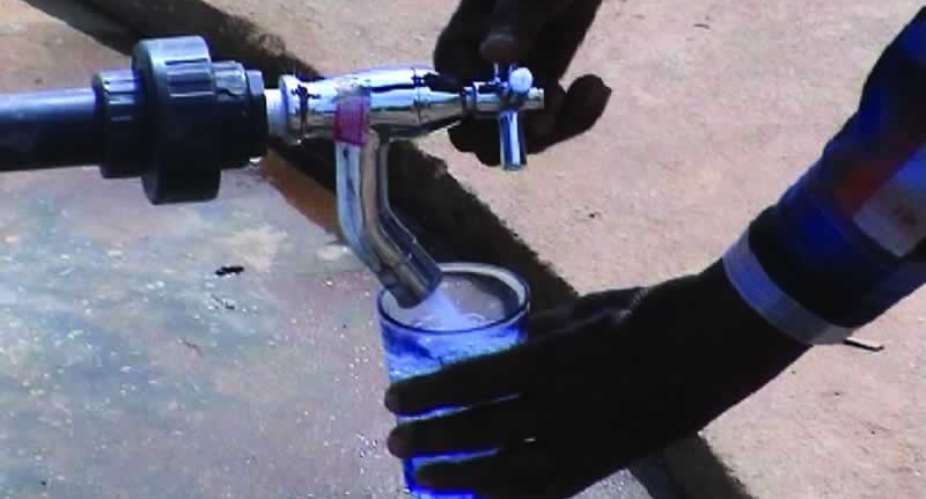The National Coalition Against the Privatization of Water (NCAP), on Monday called on government to “immediately” abrogate the contract of the Aqua Vitens Rand Limited (AVRL), and to hand over water operations to the Ghana Water Company Limited (GWCL).
The NCAP has also appealed to the Serious Fraud Office (SFO), to investigate the activities of AVRL because as per their contract with Ghana, water quality had not improved and the company had not met the standards set out in its contract with the government of Ghana.
“Aqua Vitens Rand Limited is not making headway in solving Ghana's water supply system. The company has failed to improve Ghana's water system since it took over the management of urban water”, said Al-Hassan Adam, Southern Sector Coordinator of the NCAP at a press conference in Accra.
 |  |
 |  |
| View All | |
Adam said the position of the NCAP was strengthened by a recent technical audit, conducted by FiCHTNER, a German consulting company, undertaken from May to July 2007, commissioned and paid for by the World Bank as part of the monitoring process of the Aqua-Vitens Rand management contract, that made “damming revelations” that constituted more grounds for the abrogation of the contract.
"We have always maintained, and this has been confirmed by the report, that management contract is not the solution to the challenges facing urban water delivery in Ghana and also that AVRL has so far woefully underperformed under its contract", NCAP will argue”, Adam said.
Adam said the report specifically indicated that chemical reagents for treating water against potential health threatening substances such as; arsenic, lead, cyanide, copper and zinc were in short supply in most cases and in some cases not available.
“This is the case for water produced in the mining communities in Western, Brong Ahafo and Ashanti Regions where surface and ground waters have been polluted by mining activities”, he said.
Adam said the report also revealed that regional laboratories did not give feed back to treatment plants, hence chemical dosing was done manually with dangers of inaccuracies.
According to him, the report also said at the Owabi treatment plant, which supplies water to Kumasi applies chemical dosing was performed without any criteria and at the Kpong Old and New treatment plants, dosing pumps do not work effectively.
Adam said the report concluded that water with high levels of iron and or manganese was occasionally directly fed into the distribution system, confirming recent media reports of stinking water pumped into homes in Osu and it surroundings.
He said the report confirmed that Aqua Vitens Rand Limited did not carry out regular quality check of water in the distribution lines, and this amounted to a “reckless compromise of the public health and safety".
The NCAP also expressed worry over attempts by FiCHTNER to lower standards for AVRL by recommending that AVRL should prepare and implement "Operations and Maintenance Management Plan and Standards Operating Procedures for 10 major supply schemes, saying, "This is not acceptable to NCAP since AVRL mandate covers 80 urban water systems."
Adam said the report conceded that the right procedure for establishing baseline information was not carried out to determine the actual strength and weakness of GWCL before entering the management contract.
The “NCAP thinks the lack of baseline information is making it difficult for any effective management of Aqua Vitens Rand limited.
"This condition has given AVRL a window of opportunity to hide its poor performance", Adam said.
He said the report also noted that the management contract had not changed anything in relation to the operation of the plants, and that no proof could be found of the presence or visits of specialized personnel from AVRL, making it doubtful whether a transfer of technology has taken place.
Adam said “The whole distribution process is handled like a black box. Only few facts are really known about the distribution process. The technical figures are derived from commercial figures, so that the monitoring of physical losses or optimization of storage capacities can hardly be achieved", Adam quoted the report as saying.
The NCAP thus said the solution to urban water challenges in Ghana was investment, comprehensive overhaul of the system and expansion of infrastructure.
They asked government and donors to view water as a social service, calling on them to make the water ownership and management to reflect these characteristics.
Adam called on the Ghana Standards Board and the Public Utilities Regulatory Commission to ensure that chemical reagents required for the treatment of water are part of the water quality standard.





 Critics fear Togo reforms leave little room for change in election
Critics fear Togo reforms leave little room for change in election
 Flooding: Obey weather warnings – NADMO to general public
Flooding: Obey weather warnings – NADMO to general public
 Fire in NDC over boycott of Ejisu by-election
Fire in NDC over boycott of Ejisu by-election
 NDC to outdoor Prof Jane Naana Opoku-Agyemang as running mate today
NDC to outdoor Prof Jane Naana Opoku-Agyemang as running mate today
 Ejisu: CPP seeks injunction to stop April 30 by-election
Ejisu: CPP seeks injunction to stop April 30 by-election
 Dismiss ECG, GWCL, GACL bosses over losses – United Voices for Change tells gov’...
Dismiss ECG, GWCL, GACL bosses over losses – United Voices for Change tells gov’...
 Submit 2023 audited financial statements by May – Akufo-Addo order SOEs
Submit 2023 audited financial statements by May – Akufo-Addo order SOEs
 Current power outages purely due to mismanagement – Minority
Current power outages purely due to mismanagement – Minority
 ECG hoists red flag to fight Ashanti Regional Minister over arrest of General Ma...
ECG hoists red flag to fight Ashanti Regional Minister over arrest of General Ma...
 Mahama’s 24hr economy will help stabilise the cedi; it’s the best sellable polic...
Mahama’s 24hr economy will help stabilise the cedi; it’s the best sellable polic...
